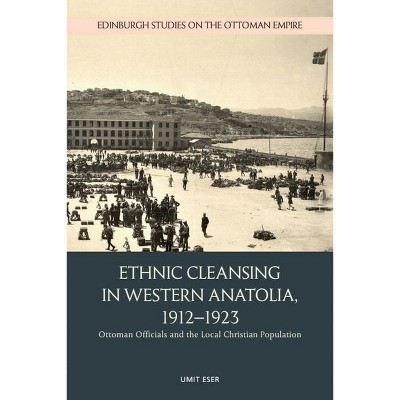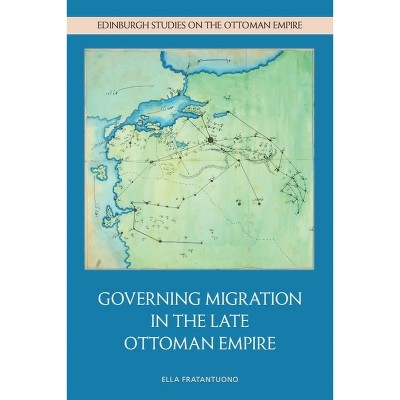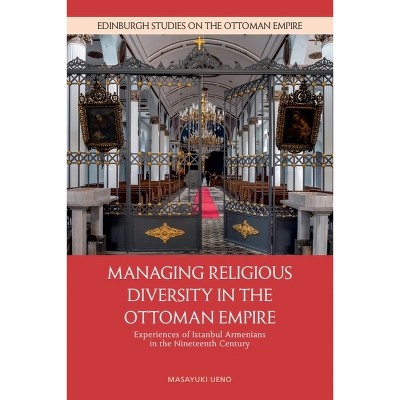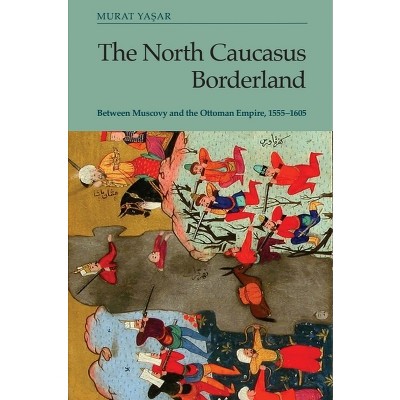The Kizilbash-Alevis in Ottoman Anatolia - (Edinburgh Studies on the Ottoman Empire) by Ayfer Karakaya-Stump (Paperback)

About this item
Highlights
- The Kizilbash were at once key players in and the foremost victims of the Ottoman-Safavid conflict that defined the early modern Middle East.
- About the Author: Ayfer Karakaya-Stump is Associate Professor of History at The College of William and Mary.
- 400 Pages
- History, Middle East
- Series Name: Edinburgh Studies on the Ottoman Empire
Description
About the Book
This first comprehensive socio-political history of the Kizilbash/Alevi communities uses a recently surfaced corpus of sources generated within their milieu. It offers fresh answers to many questions concerning their origins and evolution from a revolutionary movement to an inward-looking religious order.
Book Synopsis
The Kizilbash were at once key players in and the foremost victims of the Ottoman-Safavid conflict that defined the early modern Middle East. Today referred to as Alevis, they constitute the second largest faith community in modern Turkey, with smaller pockets of related groups in the Balkans. Yet several aspects of their history remain little understood or explored. This first comprehensive socio-political history of the Kizilbash/Alevi communities uses a recently surfaced corpus of sources generated within their milieu. It offers fresh answers to many questions concerning their origins and evolution from a revolutionary movement to an inward-looking religious order.
From the Back Cover
Explores the transformation of the Kizilbash from a radical religio-political movement to a religious order of closed communities The Kizilbash were at once key players in and the foremost victims of the Ottoman-Safavid conflict that defined the early modern Middle East. Today referred to as Alevis, they constitute the second largest faith community in modern Turkey, with smaller pockets of related groups in the Balkans. Yet several aspects of their history remain little understood or explored. This first comprehensive socio-political history of the Kizilbash/Alevi communities uses a recently surfaced corpus of sources generated within their milieu. It offers fresh answers to many questions concerning their origins and evolution from a revolutionary movement to an inward-looking religious order. Key Features - The first comprehensive social history of the Kizilbash/Alevi communities - Combines conventional sources with newly discovered ones generated within the Kizilbash-Alevi milieu itself - Argues for a readjustment in focus from pre-Islamic Central Asia to the cosmopolitan Sufi milieu of the Middle East when exploring genealogies of popular Islam in Anatolia - Explores the influence of Iraqi Sufism on popular Islam in late medieval and early modern Anatolia - Shows the potential of Sufism to provide a basis for social order and give rise to distinct communities - Offers a critical assessment of the long-standing Köprülü paradigm in the field of religious and cultural history of Anatolia - Provides a new perspective on the Ottoman-Safavid conflict, and on Sunni-Shiʿi confessionalisation in the early modern period - Opens new avenues of research in the study of other heterodox communities in the Islamic world - Includes family histories of a number of Kizilbash/Alevi saintly lineages in central and eastern Anatolia to tell their story from an internal viewpoint Ayfer Karakaya-Stump is Associate Professor of History at The College of William and Mary, Virginia.Review Quotes
Rich in its source base, scrupulous in its analysis of difficult and unwieldy historical evidence, and full of revisionist findings that overturn conventional scholarly views on Kizilbash/Alevi origins, Karakaya-Stump's study is a major breakthrough in the socio-religious history of late medieval and early modern Turkish Islam.-- "Ahmet T. Karamustafa, University of Maryland"
Stump's book is a testimony to the strength of the historical approach of Ottoman studies at Harvard [...] A careful reconstruction based on sound method and a concern for the primary sources it provides us with a serious, sustained examination of the history of the Alevis, their links to Anatolian Sufi lineages including the Bektachis, and the association with the Kizilbash in the early modern period.--Sajjad H Rizvi, University of Exeter "The Muslim World Book Review, 42:3"
The scholarly and social sensitivity Karakaya-Stump brought to bear during this work makes The Kizilbash-Alevis in Ottoman Anatolia an exemplary study that will inspire future scholarship, but which will not be easily equaled in scope and substance.--Angela Andersen, University of Victoria "Review of Middle East Studies Vol. 54, Issue 2"
This is an important book that has the potential to help us rethink much of what we think we know about Sufism in the pre-modern and early modern eras.--Vernon James Schubel "Journal of Sufi Studies"
About the Author
Ayfer Karakaya-Stump is Associate Professor of History at The College of William and Mary. She has published articles in Turcica, International Journal of Turkish Studies and British Journal of Middle Eastern Studies, and has published a monograph in Turkish with Bilgi University Press (2015).
Shipping details
Return details
Trending Non-Fiction











